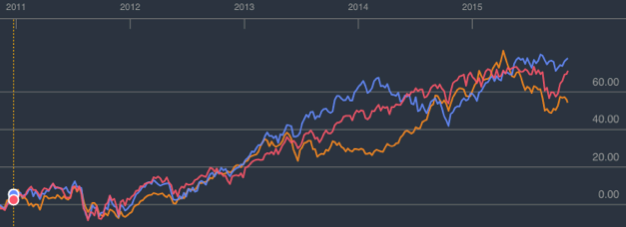“Doing good can help improve your prospects, your profits and your business, and it can change the world”
Sir Richard Branson, Founder of Virgin Group
Investment strategies emphasizing stronger environmental, social and corporate governance are set to occupy a much more important and relevant position for investors. Both our environmental and investment climates are changing, and while we strive to understand the complex issues involved, the repercussions for all of us are becoming harsher and less comfortable.
The World Bank estimates global temperatures will rise to 7.2 degrees Fahrenheit by 2100, raising sea levels by ten feet and drastically increasing extreme weather patterns. A near 40% increase in the global population by 2050 will require 70% more food and 100% more protein. Meanwhile, available farmland is shrinking due to the impact of urbanization, synthetic agrochemical damage and severe desertification.
Almost a decade after the Global Financial Crisis, investor confidence is fragile and in certain sectors and regions, it is actually deteriorating. To date, the Fed’s refusal to raise interest rates off zero is an acknowledgement that our growth prospects and business confidence remain poor – something prolonged exposure to quantitative easing was supposed to fix.
We are entering a new age – one that will require a balancing act between the understanding of our impact on the environment and the need to invest in solutions needed for a sustainable and profitable future. A growing number of investors, corporations and financial professionals are therefore deploying and managing capital to take account of this shift.
There is a realization that those open to considering ethical opportunities will enjoy greater opportunities. According to the Forum for Sustainable and Responsible Investment, the value of assets tracking the Environmental, Social and Governance (ESG) investment standards in the United States has grown by 76% to $5.67 trillion since 2012. They now account for one in every six US dollars under professional management in the United States, and comprise nearly 18% of the $36.8 trillion in total assets under management globally.
This isn’t an isolated trend. In the 12 months to June 2014, the European retail market for SRI funds grew by 18% to $16.8 billion. In the UK, companies that consistently manage their activities responsibly have outperformed their FTSE 350 peers in seven out of the past eight years.
Standard Life’s UK Ethical Fund has Outstripped the S&P 500 for the Majority of 2015
Relative Performance of the S&P 500 (Red), First State Asia Pacific Sustainability Fund (Orange) and Standard Life’s Ethical Fund (Blue) Over the Past Five Years
Source: Bloomberg (2015)
At the non-governmental level, the United Nations set up the global ‘Principles for Responsible Investment’ in 2006 emphasizing the importance of environment, human rights and labor rights issues in the financial decision making processes. The 1,308 signatory firms, with total assets of over $45 trillion, include Allianz SE, the Lloyds Banking Group, AXA Group, BBVA and Bank of America Global Asset Management. Over 800 firms from more than 30 countries now publicly disclose progress towards this goal.
Ours is a time of rapid global change with catalysts shifting human priorities towards the necessities for life. These catalysts comprise a socio-economic system that has shifted consumption patterns, harmed the environment and caused an unprecedented depletion of the planet’s strategic resources. Despite the increasingly bleak scenario we face, there is a solution: an alignment of the human race and the planet’s ecosystem embracing a revolutionary transformation in global agriculture, healthcare, energy systems and construction.
Welcome to the new world.
